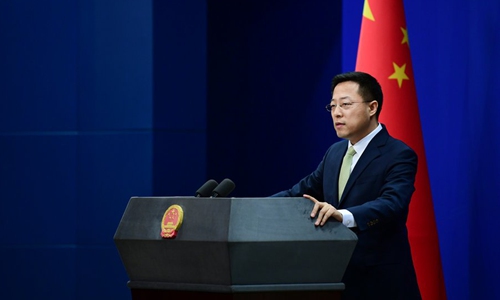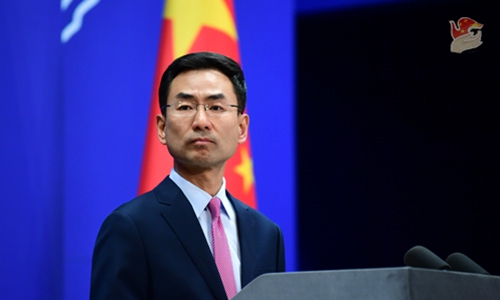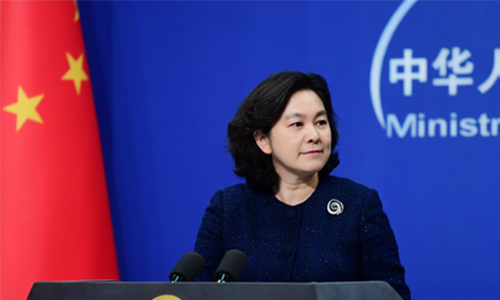Young Chinese idolize FM spokespersons, welcome ‘Wolf Warrior’ diplomats
By Huang Lanlan Source:Global Times Published: 2020/5/21 22:24:19

Zhao Lijian, spokesperson of the Chinese Foreign Ministry (Photo: fmprc.gov.cn)
Chinese college student Vicky Chi, 18, recalled how excited she was when hearing China's Foreign Ministry spokesperson Zhao Lijian's remarks fighting back against the US' defamation of China amid the novel coronavirus pandemic.
Chi cited Zhao's criticism of the Wall Street Journal as "lacking the courage to make an apology" for its insulting title China is the Real Sick Man of Asia in February, and his response to a Fox News host demanding China to apologize for the virus outbreak as "I don't remember anyone asking the US to apologize (for the H1N1 flu)."
"Zhao's words really hit the spot," Chi said, adding that her impression of the US has "fallen off a cliff" ever since the country started provoking the trade war with China and suppressing Chinese telecom giant Huawei. "His hitting back at the US is a kind of catharsis for me."
Zhao and some other Chinese diplomats are becoming increasingly popular among Chinese people with their personalized remarks and resolute attitudes defending China's interests.
Their "Wolf Warrior" style of diplomacy, though attacked by some Westerners as "strident and combative," is bringing them numerous domestic fans, especially young ones like Chi.

China’s Foreign Ministry spokesperson Geng Shuang. Photo: Chinese Foreign Ministry
Embrace 'Wolf Warrior' diplomacy
The current three Foreign Ministry spokespeople, Hua Chunying, Zhao Lijian and Geng Shuang, have impressed the public with distinctive characteristics. Their fans that the Global Times talked to described Hua as "gentle and incisive," Zhao as "forceful and unruffled," and Geng as "thoughtful and elegant."
Many fans of Chinese diplomats - some renowned incumbent and former foreign ministry spokespeople in particular - come from Generation Z and have a strong sense of national identity and pride.
Most fans are between 15 and 25 years old, said Chi who manages a 14,000-member online fan community of Zhao's on Weibo. They are young, confident, vibrant, and interested in national and international affairs.
They are fond of China's "Wolf Warrior" style of diplomacy, many fans say.
"Diplomacy of a strong country like China should reflect that strength," said a fan named Li Kang.
Li, an 11th grader, is a manager of a Weibo fan community for Lu Kang, a former Foreign Ministry spokesperson and Li's favorite diplomat.
Li remembers many of Lu's remarks. He quoted Lu's comment on the US proposal compelling China to join the New START (a nuclear arms reduction treaty between the US and Russia) in May 2019: "Is the US trying to increase China's nuclear arsenal to its level or reduce its own nuclear arms to China's level?" Li praised it as being smart and forthright.

Foreign Ministry spokeswoman Hua Chunying Photo: fmprc.gov.cn
Chi also said she likes the style of the Chinese diplomats who "are not afraid of the US' provocations and can fight back at ease."
"I remember that many years ago, some citizens sent calcium tablets to the foreign ministry to express their dissatisfaction with its inadequate diplomatic tone," Chi said. "Now I'm pleased to see our diplomats firmly say 'No' to the provocations and attacks to uphold our national dignity."
"I'm willing to call them 'Wolf Worriers' and even lions," she told the Global Times.
Many fans reached by the Global Times refuted the criticism by some Western politicians and media claiming China's perceived "Wolf Warrior" diplomacy is overly aggressive.
College student Wen Poshui, a fan of Chinese diplomats, said it is in the nature of things that any country will take a tough stand when it comes to national dignity and sovereignty.
"Having been occupying the center of international opinion for long, Westerners seem to have become so accustomed to a 'submissive' role of Chinese diplomacy that they think we should be busy with uploading cute panda videos," Wen said, calling such a mindset arrogant and self-righteous.
A fundamental difference between China's and some Western countries' diplomacy is that China's seemingly tough tone is not a tool to attack others but a reaction to outside suppression and smear campaigns, said Chu Yin, a professor at the University of International Relations.
"In general, Chinese diplomacy is not inclined toward offense but defense," Chu told the Global Times. "It is soft and flexible when there are no attacks toward China."
Step closer
With a growing international influence, diplomacy is no longer a matter reserved to elites but a public concern in today's China, experts said.
"When diplomatic affairs have become something that all the citizens, especially youngsters, care about, the government must respond to this request by expressing its diplomatic policies to the public in an understandable way," noted Chu.
Chinese diplomacy has been stepping closer to the general public in recent years. Diplomats don't mind changing their once "low-profile, enigmatic" style to a more vivid and personalized form, some fans commented.
Diplomats have become active on social media as well. Veteran fan Wen said some of her posts and comments on Twitter were liked by Zhao amid the pandemic.
"I once thought they (diplomats) were very far from me," Wen said. "But now they have opened their Weibo and Twitter accounts and even interact with us on these platforms; I daren't imagine this in the past."
The Information Department of the Foreign Ministry opened its Weibo and Douyin (Chinese domestic version of TikTok) accounts respectively in May and July of 2019. It has some 10 million Douyin followers and more than 1.13 million Weibo followers after months of frequent uploads of articles, videos and photos of diplomats' remarks.
The common touch of diplomats contributes to their popularity among young Chinese. On Weibo, fans voluntarily build fan communities for their favorite diplomats and actively discuss topics from their remarks to their clothes, hairstyles and memes.
A fan said she likes to talk about Geng's neckties with other fans. "He seems to have a lot of neckties," the 19-year-old laughed.
But fan community managers said they are most importantly trying to educate and persuade some members not to treat their diplomat idols as entertainment stars.
"We suggest they mainly focus on diplomats' work rather than their clothing, privacy or other trivial matters," said a fan community manager surnamed Ma.
Not 'little pinks'
Chinese diplomats are becoming models for the young generation. Lots of Gen-Z fans said they are inspired by them to learn English, work or study hard and be concerned with state affairs.
Nana (pseudonym), 23, regularly collects bilingual remarks by her favorite diplomat Hua in her notebook. She said the rhetoric of Hua's remarks is worth learning, such as her comment on the "human rights" and "democracy" preached by some Western politicians during the illegal and violent protests in Hong Kong last year. Hua said they were "just as illusory as a mirage in the desert or the Sirens' song on the sea."
Yan Er (pseudonym)'s favorite diplomat is Geng. She said the dream of many of Geng's fans is being a diplomat like him in the future. "I am considering pursuing a master's degree in diplomacy after graduation," added the college freshman, who majored in finance.
Fans like Yan Er and Nana who are steeped in remarks of the Chinese diplomats they love are naturally getting increasingly patriotic. They nonetheless deny the "little pink" label, which the media uses to refer to young people who are fired up with patriotic zeal and try to guard China against any criticism online.
Some teenage fans may just be too young to express their opinions in a 100-percent proper way, Chi said. "They should not be labeled 'little pinks' if they neither hurt others nor get involved in some sensitive political issues," she added.
Several managers of fan communities of diplomats told the Global Times the overwhelming majority of their members are rational and objective, and they haven't found any extreme behavior.
"If a member overstepped the line, I would warn them and delete their posts," Chi said.